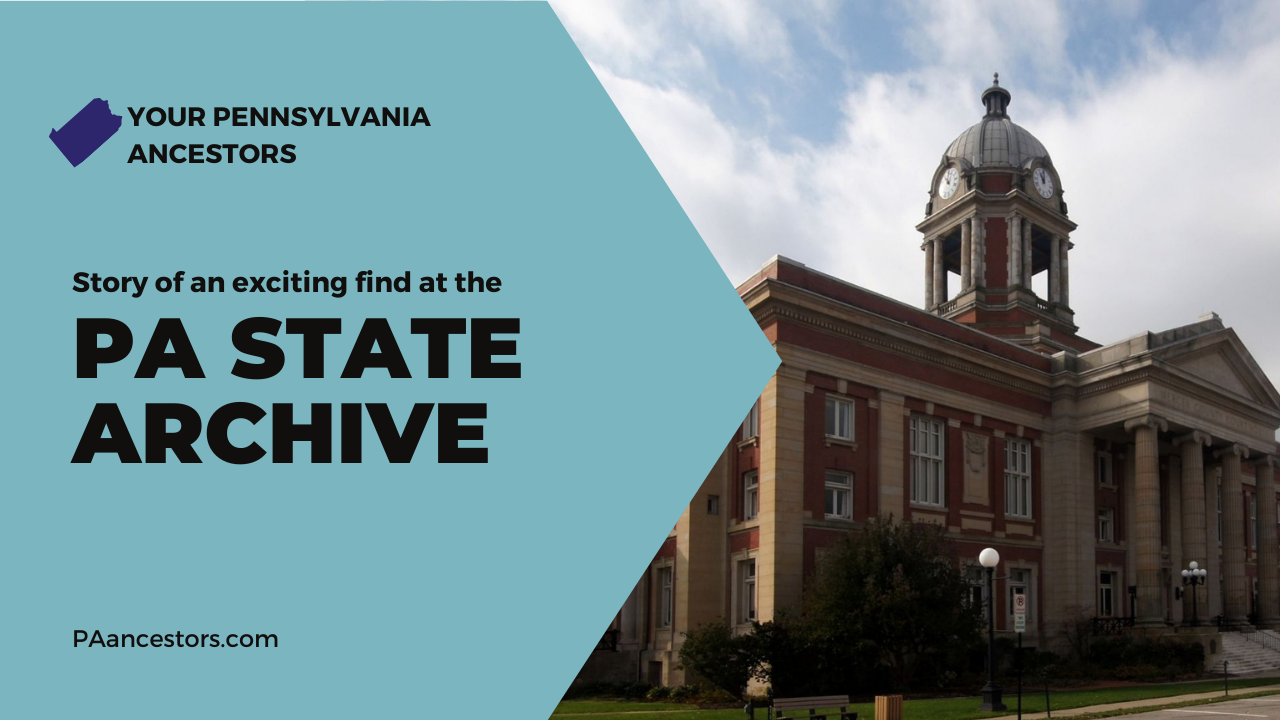Podcast Episode 48: Story of Finding an Ancestor in Court Records
A story of finding an ancestor in colonial court records in Pennsylvania.

An exciting story of finding an ancestor in court records from Aaron McWilliams of the Pennsylvania State Archives.
Watch on YouTube
Transcript
[00:00:02] Aaron McWilliams: I found a deposition and this is, this is one of those instances where you just stumble across something. I was doing research for someone else that had sent in a request to search in the depositions for the land office. And I was flipping through those and I come across a McWilliams name. I’m like, huh.
[00:00:20] All right. Well, that’s interesting. And it’s Mercer county. I’m like, I know of McWilliams Mercer county. And I had always, I was always wondering if my John was that John in Mercer county, because it’s around the right time period, 1790s it’s really close to Erie county. So I go and I look at that and I start reading.
[00:00:39] In reading it and I’m like, oh, there’s other depositions. And there, they referenced that there’s a deposition from this John McWilliams. I’m like, oh gosh, I got to find that. And I looked at, it, looked at, I spent so much time going through these cause they’re not indexed at all. And so I’m just flipping through and I come across as deposition and I come across several other depositions related to this case at all, reference him.
[00:01:01] And it was an exhilarating find, but it’s at high and low that genealogists are all expecting. I have no evidence that it’s him, nothing in his deposition, nothing in all the other records that talk about him, provide enough information to say it’s my guy at all. In the timeline that he provides and the deposition sort of eliminates my guy.
[00:01:25] But it’s, it’s such a situation though that you, you, you wonder, could it have been a lie, some of the information, because it’s dispute. And, and reading these depositions, everybody’s telling a little bit different story and it all depended on time when someone was there when they did this. So which side is kind of fibbing, cause they’re all telling different stories about it.
[00:01:48] And I, I looked at the signature on it and it doesn’t look like my guy’s signature, but it’s very clean and neat signature. So then it makes me wonder, was it a clue? Did someone else kind of sign the document for him? Because the signature is so it’s like a, clerk’s neat. It is so beautifully written that in looking at everybody else’s deposition, no one else has that beautiful signature, except for another McWilliams that was signed. They had almost the exact same signature.
[00:02:17] But I want him to be mine because in the depositions you find out that this John McWilliams had threatened to blow the brains out of another settler there. And the deposition said that while the other settlers were talking to him to try and calm him down and trying to settle the situation.
[00:02:35] They said he started pulling out bullets and putting them in his mouth, the get ready to load the rifle so that those settlers decided to leave. I’m like, it’s such a great, great story related to this guy and, and there’s con there’s conflict. There’s people stealing pot. The shingles off of roof burning down people’s cabins.
[00:02:54] I mean, it’s such a great story. If you’re talking about narratives, it’s such a great story. I want to tie into him in this conflict, but it’s not enough, but it’s a great story.
[00:03:04] That’s fantastic. And it blows apart this belief that we had, that everyone got along so well in the past, you know, it was all wonderful until the civil war and then everything fell apart.
[00:03:16] Denys Allen: And then we all got along again. It’s like, no,
[00:03:19] Aaron McWilliams: it is it’s, it’s everything kind of balled up in one, because not only do you have that, but it also has the complexity of things. In this case, there was three different parties involved. You had squatters, which the McWilliams and the handful of others, where you had a land speculation company, a company with shareholders in Philadelphia, just buying land up in Western Pennsylvania.
[00:03:39] Then you have land jobbers that were involved. These are, these are individuals that had basically. Went up into the, the, the woods, found a piece of land, maybe girdled, some trees, and then say it’s a mine and try and sell it. So you have all these parties arguing. You have different allegiances being formed between the parties.
[00:03:59] You have the squatters teaming up with the population company. You had land genres teaming up with some other squatters it’s it just shows the complexity of history that that’s there, that you often don’t come across if you’re just collecting names and dates and places.
[00:04:15] Denys Allen: And I bet you learned more about history reading that document and getting all the contexts researching your ancestor than you ever did in a class.
[00:04:24] Aaron McWilliams: Yeah. You, you learned that you learned, I mean, we learned the big, the big events the, the, the, the big issues in history in school, but it’s, it’s this microcosm. You know, this is boiling under the surface. That was also there, that, that did touch on it. It’s kind of like the sun, you have all those different layers of all the bubbling gases, and only some of it reaches the surface.
[00:04:49] And that’s what we see is that surface explosion, but it’s all of these interactions under the surface that, that lead to these major events that, that largely remain uncovered. And it keeps on going deeper. You know, you have the state level, you have the county level, the regional level, and then you have the local level and all of that filters up.
[00:05:08] Denys Allen: It’s so true. It’s part of me, doesn’t know how people are not addicted to genealogy. I mean, so fascinating as you travel back and learn all these stories. I mean, it’s just never ending for, for so many of us.
